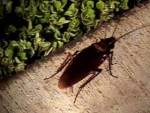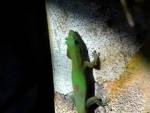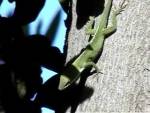

 My daughter found and I photographed these creatures yesterday. Can you tell where I am by identifying them? From left to right: Roach (the size of my thumb), day gecko, anole. I wish you luck, because none of them are endemic to this area. Maybe that’s the hint you need. More photos in my next post.
My daughter found and I photographed these creatures yesterday. Can you tell where I am by identifying them? From left to right: Roach (the size of my thumb), day gecko, anole. I wish you luck, because none of them are endemic to this area. Maybe that’s the hint you need. More photos in my next post.
The next time someone asks you why we should save our biodiversity, tell them this: “Doing so will prolong and improve the lives of billions of people … including your own sorry ass.” This article found in People and Planet summarizes a report just released by the WWF describing compounds recently discovered in the jungles of Borneo with the potential to treat AIDS, TB, cancer, and malaria.
Mining biodiversity for its potential to help humanity is no fairy tale. I would have died at the age of 12 without penicillin to protect me from secondary infection following surgery. My youngest daughter (the one who found these animals for us) would have died at the age of two for the same reason. Napoleon’s and Lincoln’s surgeons lopped off tens of thousands of arms and legs to save wounded soldiers from certain death by infection.
About a third of you out there would not be out there without that one drug, derived from a mold. Penicillin and its derivatives (amoxicillin, carbenizillin, methicillin, augmentin, ticarcillin, bicillin) continue to this day to save hundreds of millions of lives annually. That is just one chemical derived from biodiversity. Almost one out of four of our pharmaceuticals came from chemicals discovered in just 40 plants and animals. There may be millions of undiscovered molds. We are losing hundreds of species annually — species we did not even know existed. We have documented only a fraction of the species estimated to exist. At present rates of habitat destruction, half of all species will be extinct in the next 50 to 100 years. Like Joni said: you don’t know what you’ve got ’til its gone.


 My daughter found and I photographed these creatures yesterday. Can you tell where I am by identifying them? From left to right: Roach (the size of my thumb), day gecko, anole. I wish you luck, because none of them are endemic to this area. Maybe that's the hint you need. More photos in my next post.
My daughter found and I photographed these creatures yesterday. Can you tell where I am by identifying them? From left to right: Roach (the size of my thumb), day gecko, anole. I wish you luck, because none of them are endemic to this area. Maybe that's the hint you need. More photos in my next post. 
